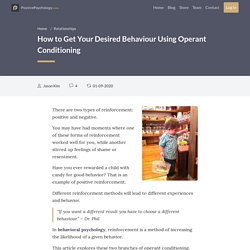

Parents must learn how to guide and influence their child's behaviour. Ideas which may have worked in the past, may not be applicable in today's context.
Let us explore how operant conditioning which is a form of learning where the repercussions of behaviours encourage behaviour change.
PSY108 TMA01 pearltree. Operant conditioning. Operant Conditioning.
Operant Conditioning - Negative Reinforcement vs Positive Punishment. Positive and negative reinforcement. Positive Reinforcement - The Big Bang Theory. Negative Reinforcement. Positive and negative punishment. Positive Punishment. Negative Punishment. Positive and negative punishment.
Raising a teenager in Singapore: How to keep your cool! Teenagers: 20 tips for good behaviour. 1.

Take time to actively listen Actively listening means paying close attention to what your child is saying and feeling, rather than thinking of what you want to say next. This shows your child that you care and that you’re interested. 2. Set clear rules about behaviour Family rules make expectations about behaviour clear. How to Get Your Desired Behaviour Using Operant Conditioning. There are two types of reinforcement: positive and negative.

You may have had moments where one of these forms of reinforcement worked well for you, while another stirred up feelings of shame or resentment. Have you ever rewarded a child with candy for good behavior? Positive Reinforcement - Tips for teaching and parenting. Call these helplines if you need emotional or psychological support. As we do our part to practise safe-distancing to protect the health of ourselves and those around us, paying attention to our mental and emotional well-being is equally important as well.

Connect with family or friends Staying connected with family and friends through phone or video calls can do a lot for your mental health. Use these virtual meet-ups to also check on your loved ones to make sure they are staying safe and coping well. Call a helpline if you need to speak to someone Many of us can experience dips in our emotional or psychological wellbeing with the COVID-19 situation – this could be due to issues with school or work, financial concerns, or fears of domestic abuse. Resources For Youths. References psy108.